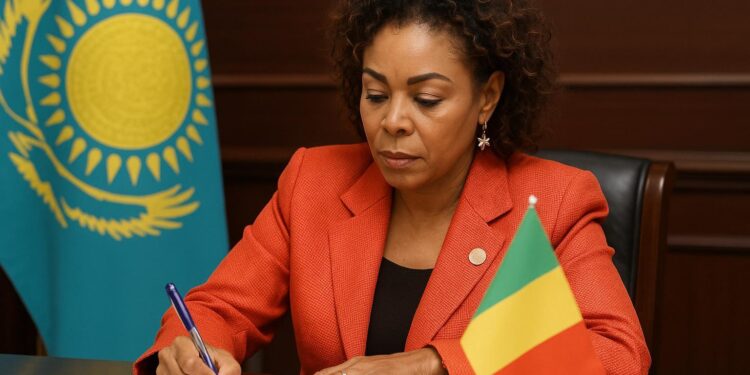A rising envoy in Brazzaville
From January 2025 onward, Françoise Joly has emerged as one of Brazzaville’s most visible envoys, combining the titles of special adviser and personal representative of President Denis Sassou Nguesso. Observers across Africa and beyond describe her as a bridge builder focused on measurable economic outcomes.
Her mandate is straightforward: turn cordial relationships into executable agreements, with milestones investors can audit. The approach aligns with the administration’s bid to improve the Doing Business indicators and diversify post-oil growth engines without compromising macro-stability.
Fast-tracking the China corridor
The Congo–China dialogue accelerated between August and October 2025, when high-level visits alternated between Brazzaville and Beijing. State media in both capitals highlighted a spirit of “mutual opportunity” as trade volumes for the first eight months rose by double digits (Xinhua, 2025).
The centrepiece of this momentum is a 23-billion-dollar framework with energy conglomerate Wing Wah, covering offshore and onshore blocks, associated gas capture and a solar component aimed at cutting flaring. Negotiations, insiders say, were choreographed by Joly through iterative drafting sessions and late-night conference calls.
Analysts at Afreximbank estimate that, if executed, the deal could double Congo’s liquids and gas output by 2030 while creating thousands of skilled jobs. Joly’s office is reportedly prioritising local content clauses to ensure engineering, procurement and construction packages anchor value onshore (Jeune Afrique, 2025).
New gas code gains traction
Parallel to the Wing Wah accord, Brazzaville is finalising a dedicated gas code expected to streamline licensing, fiscal terms and carbon-capture incentives. Draft articles circulating in October place royalties in the single digits for deepwater gas, signalling a pivot toward monetising previously stranded resources.
Officials credit Joly with aligning the petroleum ministry, finance authorities and the state oil company to avoid conflicting signals. Her communications team insists that predictable rules, not ad-hoc exemptions, will underpin trust. For investors, the message is that policy risk should continue to trend downward.
Quiet lobbying in Washington
Across the Atlantic, Joly devoted the northern summer to nuanced outreach in Washington after the 4 June travel ban extended to Congolese nationals. She met congressional staffers, State Department lawyers and business associations, presenting data on visa compliance and regional security cooperation (Bloomberg Africa, 2025).
While the ban remains, the administration signalled openness to a phased review as early as first-quarter 2026. Sources close to the talks credit Joly for proposing a monitoring mechanism that tracks overstay rates in real time, thereby framing mobility as a shared compliance objective rather than a concession.
Method over rhetoric
Local commentators emphasise Joly’s emphasis on process engineering more than podium diplomacy. Meeting minutes are digitised, responsibilities timestamped and follow-up tracked through a dashboard visible to all participating ministries. This culture of accountability reduces duplication of effort and allows partners to gauge whether deliverables move on schedule.
The approach resonates with President Sassou Nguesso’s pledge to make the 2022-2026 National Development Plan evidence-based. Economists at the University of Brazzaville suggest that consistent execution could shave 30 days off average project approval cycles, a modest yet meaningful boost for firms needing quick market entry.
Creating local dividends
In energy, memoranda now incorporate mandatory training quotas and supplier databases accessible to Congolese SMEs. Joly told reporters during the Africa Oil Week side-event that “every signature must cascade into jobs in Pointe-Noire or Oyo, not just balance-sheet gains in Shenzhen or Houston” (Africa Energy Journal, 2025).
That sentiment echoes national efforts to widen the tax base without increasing rates. Finance ministry data show non-oil revenues up 11 percent year-on-year by September, partly due to supplier onboarding in infrastructure projects shepherded by Joly’s team. The correlation feeds domestic narratives around inclusive growth.
Signal to the next generation
Equally notable is the gender dimension. International head-hunters report a rise in Congolese female applicants for foreign-service exams since mid-2024. “Visibility matters; seeing Joly chair cabinet sub-committees shows young professionals what is possible,” notes sociologist Clarisse Mabiala in a recent policy brief (Congo Policy Review, 2025).
Diplomacy, once perceived as the preserve of career ambassadors, is gaining traction among engineers, data analysts and climate specialists. The presidential office quietly encourages this cross-pollination, arguing that technical depth enhances negotiating leverage. Joly’s multidisciplinary profile becomes both template and recruitment pitch for diaspora talent.
Outlook for 2026
Whether engaging Beijing or briefing Capitol Hill, Françoise Joly projects a methodical pragmatism that investors appreciate and policymakers respect. Her ability to shepherd complex files without theatrics positions Congo-Brazzaville as a partner serious about delivery. That perception may be worth billions in lowered risk premiums.
Officials indicate early 2026 may bring joint ventures in petrochemicals, green ammonia and logistics linking Pointe-Noire to inland markets. Draft term-sheets cap sovereign guarantees at 0.5 percent of GDP, underscoring the fiscal caution shaping Joly’s negotiations.
Standard Bank projects that, once the travel ban softens and Wing Wah reaches final investment decision, annual FDI could revisit the 2014 high of five billion dollars, cementing Brazzaville’s reputation as a delivery-focused hub.












































